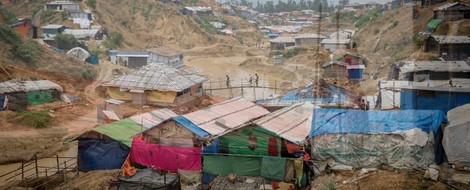Your podcast discovery platform
Curious minds select the most fascinating podcasts from around the world. Discover hand-piqd audio recommendations on your favorite topics.

piqer for: Global finds Doing Good
Helen Morgan is a writer and editor with a background in human rights and migration issues. She is an associate editor at Devex, the media platform for the global development community, focusing on multimedia storytelling and video production for thematic and issue-focused digital series. Currently based in Barcelona, Spain, she has previously written for a variety of international publications while living and working in Buenos Aires, New York and Shanghai.
3,000 Rohingya Refugees Train to Tackle Natural Disasters
Around one million people live in Bangladesh's Kutupalong Camp, now the world's largest refugee camp since the mostly Muslim Rohingya fled a military crackdown in Myanmar last year.
As the monsoon season approaches, many people are still staying in bamboo and tarpaulin shelters, where they are extremely vulnerable to landslides and flooding. Aid groups are turning to disaster preparedness as a strategy to help people survive, as reported by Kelli Rogers in this feature story for Devex.
Bangladesh is one of the most disaster-prone countries in the world. In the 1970s the country established the Cyclone Preparedness Program, modernising its early warning systems, and raising awareness at the community level about the dangers of storm surges.
Last month, teams from the CPP, the Bangladesh Red Crescent Society, and the American Red Cross began training refugees in the country’s community-based disaster preparedness programme. This in-depth reporting follows people participating in a simulation whereby small teams demonstrate warnings on the short-wave radio, followed by flag raising in front of a crowd - the number of flags raised differs depending on the severity of the storm and can raise awareness within 15 minutes of evacuation orders.
The nearly 60,000 volunteers are central to the programme, and some of the most recent recruits include 500 Rohingya men and women. The volunteers are trained twice per year whichincludes search and rescue and first aid techniques. Some of these volunteers will go door to door to ensure people are aware of the danger, while others will spread the word via megaphone, hand siren, or raising the signal flags.
In the coming months, a total of 3,000 Rohingya will be trained as CPP volunteers. And the piece also notes the importance of knowledge sharing and replicability: countries throughout Asia have sent delegations to Bangladesh to learn more about how they might adopt it for their own use.
